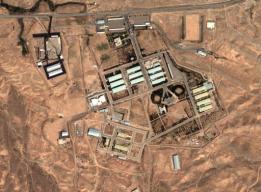 (Reuters) - Big powers hope soon to agree with�Iranto hold a new round of nuclear talks in another bid to resolve a protracted dispute over Tehran's atomic program and avert the increasing threat of a downward spiral into Middle East war.
(Reuters) - Big powers hope soon to agree with�Iranto hold a new round of nuclear talks in another bid to resolve a protracted dispute over Tehran's atomic program and avert the increasing threat of a downward spiral into Middle East war.Iran is seen by the six powers to be covertly trying to develop the means to produce nuclear weapons. They want to rein in the Islamic Republic's uranium enrichment program, to ensure it is geared only for civilian energy as Iran maintains it is, through a mix of diplomacy and economic sanctions.
They are eager to make progress soon because of Israel's increasingly pointed threats to bomb Iranian nuclear sites. Israel, widely understood to be the only nuclear power in the Middle East, views Iran's nuclear drive as a mortal threat.
Senior EU and Iranian diplomats discussed the timing and venue of possible new talks on Wednesday, said a spokesman for EU foreign policy chief Catherine Ashton, who oversees contacts with the Islamic Republic on behalf of six countries.
"Deputy Secretary-General Helga Schmid had a telephone call with (the) Iranian deputy nuclear negotiator... in order to discuss the way ahead, including possible dates and venues for a meeting with Iran," he said, referring to a senior member of the EU diplomatic service.
"We hope that agreement with Iran can soon be reached on how to continue the talks and make concrete progress towards addressing international concerns."
Britain, France, Germany, United States, Russia and�China�are hoping to agree on confidence-building measures as a step towards a final agreement with Iran. Three rounds of negotiations this year produced no breakthrough.
Western diplomats have said a new round could be scheduled as soon as January, but Ashton's spokesman declined to say what dates were discussed in Wednesday's conference call.
PREPARATIONS TAKING PLACE
Last month, senior diplomats from the six countries met in Brussels to prepare a new proposal for talks.
They are particularly concerned about Iran enriching uranium to 20 percent fissile purity, an important technological advance that brings it significantly closer to the threshold of weapons-grade material. They also want Iran to cooperate fully with the watchdog International Atomic Energy Agency (IAEA).
Iranian President Mahmoud Ahmadinejad said on Wednesday some politicians in the Islamic Republic were reluctant to resolve the nuclear dispute, apparently referring to hardline conservative rivals in Tehran's factionalized ruling elite.
Experts see Ahmadinejad as sidelined on nuclear policy, and his comments underlined differences between him and supporters of clerical Supreme Leader Ayatollah Ali Khamenei.
The president has been criticized by hardliners within Iran's power structure for saying Tehran was ready for dialogue with the United States on the nuclear program.
"Our policy is cooperation with the International Atomic Energy Agency," Ahmadinejad was quoted as saying by the Iranian Students' News Agency (ISNA).
"Of course in Iran some do not want the issue to be resolved and think it is better this way," he said, without elaborating.
In Vienna on Wednesday, a senior IAEA official said agency inspectors travelling to Iran would be prepared to go to its disputed Parchin military complex if the Islamic state were to allow a visit during talks in Tehran this week.
The IAEA believes Iran has done explosives tests with possible nuclear applications at Parchin, a facility southeast of the Iranian capital, and has repeatedly asked for access.
By Reuters
The Iran Project is not responsible for the content of quoted articles.










